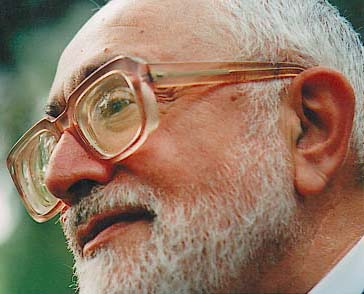
American social activist Irwin Silber has died
September 12, 2010
 Irwin Silber
Irwin Silber Irwin Silber died this week aged 84. A prominent scholar, writer and social activist, Silber was among the first Americans to defy the government ban on U.S. travel to Cuba.
In 1966 he visited Cuba openly with his wife, singer Barbara Dane on an historic visit that helped develop cultural exchanges and friendship between the two peoples.
Along with figures like Pete Seeger and Woody Guthrie, from the 40s, Silber struggled to universalize the concept of the projection of folk music as a form of social protest reclaiming the dignity of the working classes. He founded and directed substantial resources such as magazine Sing Out!, the editorial Oak Publications and Folkways label.
One outstanding element of his life was that he always tried to put the ideas and resolutions taken in meetings of progressive and revolutionary intellectuals into practical actions. One such practical result was the "Encuentro de Cancion Protesta", an international coming together of political singers from around the world held in the summer of 1967 at Havana's "Casa de las Americas" Cultural institute, which was inspired by the discussions and meetings with Cuban musicians and artists on his first visit to Cuba in 1966 together with his wife, singer Barbara Dane.
One of the ideas that came out of those meetings was that "independent means of distributing the songs coming out of the Liberation Movements around the world had to be developed" Putting these ideas into practice, Silber and Dane established, basically, in their own home, a record label where basically all the work was done by the two for over 10 years in which they published over 40 albums of this music: Paredon Records.
This label was the first in the United States to publish and popularize the music of the nascent Nueva Trova Cubana and songs like "Hasta Siempre, Comandante", by Carlos Puebla.
He participated in the world meeting of revolutionary intellectuals held in Cuba in January 1968, the "Cultural Congress of Havana" and then edited and published the book that brought together all presentations from that meeting.
Also a great lover of sports, one of his last books was the biography of the American Communist journalist Lester Rodney, whose work as a sports writer helped to achieve the ending of the exclusion of Afro-Americans in professional sports, especially baseball.
Irwin Silber devoted his life to the struggle for a better world. Facing repression and the politics of fear in the McCarthy era, Silber was part of a generation of leftist intellectuals who achieved massive change in the concepts of race and class culture exclusion in the United States.
(This was originally submitted by Pablo Menendez --founder and leader of Grupo Mezcla and Irwin's step-son, to Cubadebate, in Spanish. This version includes some of Pablo's re-translation and expansion of the fourth paragraph.)
http://groups.yahoo.com/group/CubaNews/message/117908
http://www.cubadebate.cu/noticias/2010/09/12/murio-el-luchador-social-norteamericano-irwin-silber/
Murió el luchador social norteamericano Irwin Silber

Irwin Silber
Falleció esta semana a los 84 años, el destacado intelectual, escritor y luchador social Irwin Silber, quien fue uno de los primeros norteamericanos en desafiar la prohibición del gobierno de los Estados Unidos a los viajes a Cuba.
En 1966 visito a Cuba abiertamente, en compañía de su esposa, la cantante Bárbara Dane en una visita histórica que ayudo a desarrollar intercambios culturales y de amistad entre los dos pueblos.
Junto a figuras como Pete Seeger y Woody Guthrie, desde los años 40, Silber lucho para universalizar el concepto de la proyección de la musica folklorica como una forma de protesta social y de reclamo de dignidad de las clases trabajadoras fundando y dirigiendo importantes medios como la revista Sing Out!, el editorial Oak Publications y la disquera Folkways.
Siempre se destacó por llevar a la realizacion práctica las ideas salidas de reuniones de intelectuales progresistas y revolucionarios: de los encuentros con musicos y artistas cubanos en su primera visita a Cuba salió la inspiración para la realización del “Encuentro de Cancion Protesta de la Casa de las Américas”, que reunió en la Habana a artistas de todo el mundo.
Siguiendo las ideas discutidas en esa reunión, creó junto a Barbara Dane un sello de discos para difundir la música de las luchas de liberación de todo el mundo, siendo este sello el primero en publicar y popularizar en los Estados Unidos a la música de la naciente Nueva Trova Cubana y canciones como “Hasta Siempre, Comandante”, de Carlos Puebla.
Participó en el encuentro mundial de intelectuales revolucionarios realizado en Cuba en enero de 1968, el “Congreso Cultural de la Habana” y luego editó y publicó el libro que reunió todas las ponencias de ese encuentro.
Gran amante también del deporte, uno de sus últimos libros fue la biografía del periodista comunista norteamericano Lester Rodney, quien ayudo con su trabajo como cronista deportivo, a lograr el fin de la exclusión de Afro-norteamericanos del deporte profesional, especialmente el béisbol.
Irwin Silber dedicó toda su vida a la lucha por un mundo mejor. Enfrentandose a la represion y la politica del miedo de la epoca del macartismo, Silber fue parte de una generación de intelectuales de izquierda que lograron cambiar a nivel masivo conceptos de la cultura racista y clasista y de exclusión de los Estados Unidos.
(Enviado por Pablo Menéndez a Cubadebate)